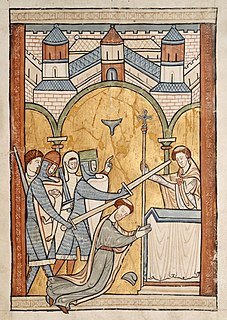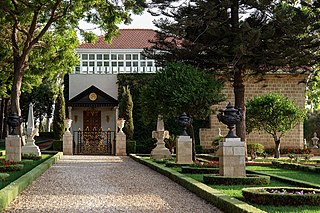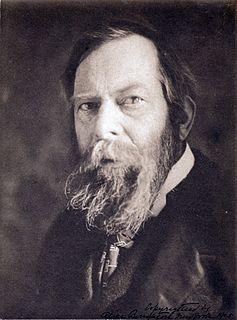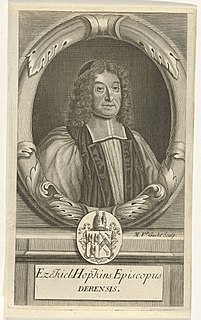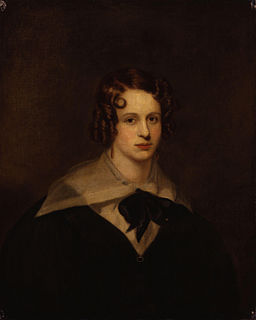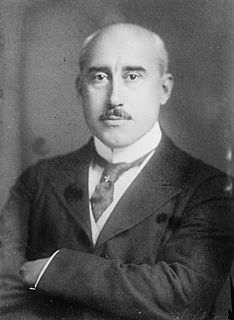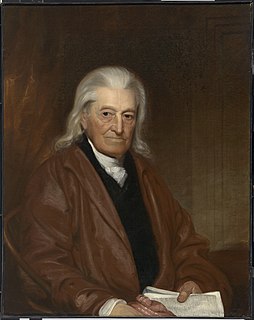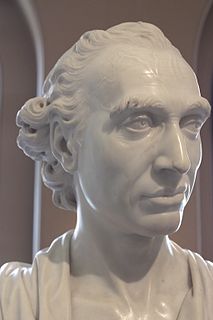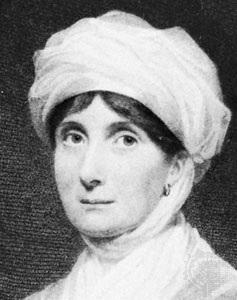Top 1200 Hath Quotes & Sayings - Page 19
Explore popular Hath quotes.
Last updated on April 20, 2025.
Prophet may you be! If I be false, or swerve a hair from truth, when time is old and hath forgot itself, when waterdrops have worn the stones of Troy, and blind oblivion swallowed cities up, and mighty states characterless are grated to dusty nothing, yet let memory, from false to false, among false maids in love, upbraid my falsehood!
The believing man hath the Holy Ghost; and where the Holy Ghost dwelleth, He will not suffer a man to be idle, butstirreth him up to all exercises of piety and godliness, and of true religion, to the love of God, to the patient suffering of afflictions, to prayer, to thanksgiving, and the exercise of charity towards all men.
Nature always wears the colors of the spirit. To a man laboring under calamity the heat of his own fire hath sadness in it. Then there is a kind of contempt of the landscape felt by him who has just lost by death a dear friend. The sky is less grand as it shuts down over less worth in the population.
Chhath is made up of two Hindi words - 'Chah,' indicating six stages and 'Hath' representing the act of austerity. The vratti observing this strict fast is believed to acquire solar energy in six different stages. It is one of the most scientific puja known to mankind and offers a host of health benefits.
Alas!... what is it, valiant knight, save an offering of sacrifice to a demon of vain glory, and a passing through the fire of Moloch? What remains to you as a prize of all the blood you have spilled, of all the travail and pain you have endured, of all the tears which your deeds have caused, when death hath broken the strong man's spear, and overtaken the speed of his war-horse?
In the operative opinion of the world, he who is already fully provided with what is necessary for him, that man shall have more;while he who is deplorably destitute of the same, he shall have taken away from him even that which he hath. Yet the world vows it is a very plain, downright matter-of-fact, plodding, humane sort of world.
The malcontent is neither well, full nor fasting; and though he abounds with complaints, yet nothing dislikes him but the present; for what he condemns while it was, once passed, he magnifies and strives to recall it out of the jaw of time. What he hath he seeth not, his eyes are so taken up with what he wants; and what he sees he careth not for, because be cares so much for that which is not.
Government is, or ought to be instituted for the common benefit, protection, and security of the people, nation, or community... when any government shall be found inadequate or contrary to these purposes, a majority of the community hath an indubitable, inalienable, and indefeasible right to reform, alter, or abolish it, in such manner as shall be judged most conducive to the public weal.
At Tara in this fateful hour, I place all Heaven with its power, And the sun with its brightness, And the snow with its whiteness, And the fire with all the strength it hath, And the lightning with its rapid wrath, And the winds with their swiftness along their path, And the sea with its deepness, And the rocks with their steepness, And the earth with its starkness: All these I place, By God's almighty help and grace Between myself and the powers of darkness!
He is like to be mistaken who makes choice of a covetous man for a friend, or relieth upon the reed of narrow and poltroon friendship. Pitiful things are only to be found in the cottages of such breasts; but bright thoughts, clear deeds, constancy, fidelity, bounty and generous honesty are the gems of noble minds, wherein (to derogate from none) the true, heroic English gentleman hath no peer.
Neutrality in things good or evil is both odious and prejudicial; but in matters of an indifferent nature is safe and commendable. Herein taking of parts maketh sides, and breaketh unity. In an unjust cause of separation, he that favoreth both parts may perhaps have least love of either side, but hath most charity in himself.
But indeed an old religious uncle of mine taught me to speak, who was in his youth an inland man; one that knew courtship too well, for there he fell in love. I have heard him read many lectures against it; and I thank God I am not a woman, to be touched with so many giddy offenses as he hath generally taxed their whole sex withal.
A man is known by the books he reads, by the company he keeps, by the praise he gives, by his dress, by his tastes, by his distastes, by the stories he tells, by his gait, by the notion of his eye, by the look of his house, of his chamber; for nothing on earth is solitary but every thing hath affinities infinite.
It is easier for an artful Man, who is not in Love, to persuade his Mistress he has a Passion for her, and to succeed in his Pursuits, than for one who loves with the greatest Violence. True Love hath ten thousand Griefs, Impatiencies and Resentments, that render a Man unamiable in the Eyes of the Person whose Affection he sollicits.
We are as much strangers in nature, as we are aliens from God. We do not understand the notes of birds. The fox and the deer run away from us; the bear and tiger rend us. We do not know the uses of more than a few plants, as corn and the apple, the potato and the vine. Is not the landscape, every glimpse of which hath a grandeur, a face of him?
There is no observation more frequently made by such as employ themselves in surveying the conduct of mankind, than that marriage, though the dictate of nature, and the institution of Providence, is yet very often the cause of misery, and that those who enter into that state can seldom forbear to express their repentance, and their envy of those whom either chance or caution hath withheld from it.
Writing is eternal, For therein the dead heart liveth, the clay-cold tongue is eloquent, And the quick eye of the reader is cleared by the reed of the scribe. As a fossil in the rock, or a coin in the mortar of a ruin, So the symbolled thoughts tell of a departed soul: The plastic hand hath its witness in a statue, and exactitude of vision in a picture, And so, the mind, that was among us, in its writings is embalmed.
Every age hath its own problem, and every soul its particular aspiration. The remedy the world needeth in its present-day afflictions can never be the same as that which a subsequent age may require. Be anxiously concerned with the needs of the age ye live in, and centre your deliberations on its exigencies and requirements.
The summer Night comes brooding down on Earth, As Love comes brooding down on human hearts, With bliss that hath no utterance save rich tears. She floats in fragrance down the smiling dark, Foldeth a kiss upon the lips of Life-- Curtaineth into rest the weary world-- And shuts us in with all our hid delights.
The Great Being saith: Human utterance is an essence which aspireth to exert its influence and needeth moderation. As to its influence, this is conditional upon refinement which in turn is dependent upon hearts which are detached and pure. As to its moderation, this hath to be combined with tact and wisdom as prescribed in the Holy Scriptures and Tablets.
But Satan, the god of all dissension, stirreth up daily new sects, and last of all (which of all other I should never have foreseen or once suspected) he hath raised up a sect of such as teach that the Ten Commandments ought to be taken out of the church, and that men should not be terrified with the law, but gently exerted by the preaching of the grace of Christ.
Christ's enemies are but breaking their own heads in pieces, upon the Rock laid in Zion; and the stone is not removed out of its place. Faith hath cause to take courage from our very afflictions; the devil is but a whetstone to sharpen the faith and patience of the saints. I know that he but heweth and polisheth stones, all this time, for the new Jerusalem.
A man hath riches. Whence came they, and whither go they? for this is the way to form a judgment of the esteem which they and their possessor deserve. If they have been acquired by fraud or violence, if they make him proud and vain, if they minister to luxury and intemperance, if they are avariciously hoarded up and applied to no proper use, the possessor becomes odious and contemptible.
Christ hath arisen! O mountain peaks, attest-
Witness, resounding glen and torrent wave!
The immortal courage in the human breast
Sprung from that victory-tell how oft the brave
To camp midst rock and cave,
Nerved by those words, their struggling faith have borne,
Planting the cross on high above the clouds of morn!
Keep your children as much as may be from ill company, especially of ungodly playfellows. It is one of the greatest dangers for the undoing of children in the world; especially when they are sent to common schools: for there is scarce any of those schools so good, but hath many rude and ungodly ill-taught children in it.
You this day, gentlemen, assume new characters, enter into new relations, and consequently incur new duties. You have, by the favor of Providence and the attention of your friends, received a public education, the purpose whereof hath been to qualify you the better to serve your Creator and your country.
There rolls the deep where grew the tree. O earth, what changes hast thou seen! There where the long street roars, hath been The stillness of the central sea. The hills are shadows, and they flow From form to form, and nothing stands; They melt like mist, the solid lands, Like clouds they shape themselves and go.
The law hath so many contradictions and varyings from itself, that the law may not improperly be called a law-breaker. It is become too changeable a thing to be defined: it is made little less a Mystery than the Gospel. The clergy and the lawyers, like the Freemasons, may be supposed to take an oath not to tell the secret.
There is no attribute of God more comforting to His children than the doctrine of Divine Sovereignty. Under the most adverse circumstances, in the most severe troubles, they believe that Sovereignty hath ordained their afflictions, that Sovereignty overrules them, and that Sovereignty will sanctify them all.
I do not so much rejoice that God hath made me to be a Queen, as to be a Queen over so thankful a people. Therefore I have cause to wish nothing more than to content the subject and that is a duty which I owe. Neither do I desire to live longer days than I may see your prosperity and that is my only desire.















